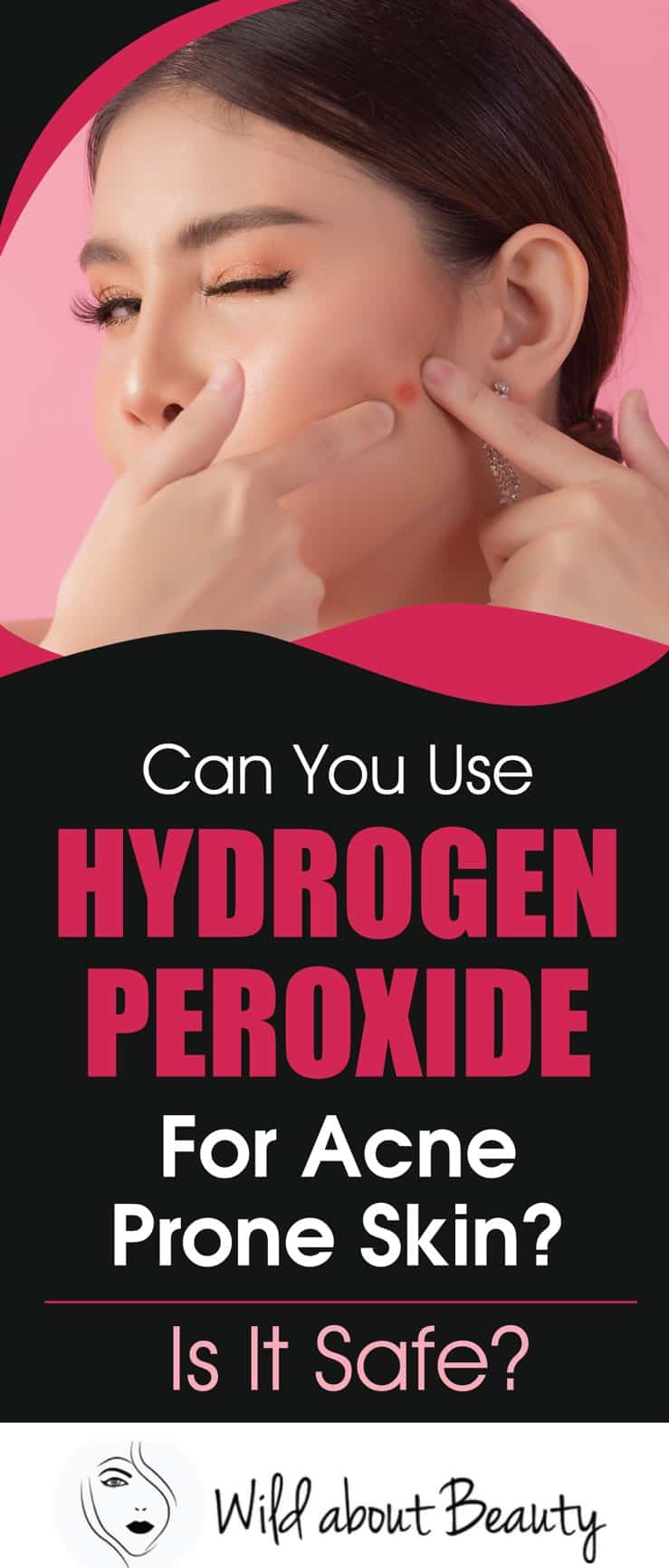Navigating the world of home remedies for acne can be quite challenging, as not all solutions are created equal. Some may work wonders for your skin, while others might not be as effective or even cause harm. Among the numerous natural remedies available, hydrogen peroxide has gained popularity for its readily available, cost-effective, and infection-fighting properties.
In this article, we will explore the use of hydrogen peroxide for acne treatment, addressing its safety, possible side effects, and precautions. As we dive into this topic, it’s crucial to remember that consulting a dermatologist, doctor, or healthcare provider is always the best course of action before trying any new over-the-counter (OTC) treatments.
Chapter Overview
What Is Hydrogen Peroxide?
Hydrogen peroxide is a clear, viscous liquid with antimicrobial properties and acts as a strong oxidizing agent. Often used as a disinfectant and antiseptic, this simple peroxide is commonly found in concentrations ranging from 3% to higher levels, with the former being the safer option for household use.
- Sold in brown bottles to protect the solution from light and heat, which can lead to the loss of its extra oxygen atom.
- Functions by breaking down into water and oxygen when applied to surfaces, releasing reactive oxygen atoms to destroy germs and bacteria.
- Can be diluted to different concentrations for various applications, but be cautious when handling concentrated hydrogen peroxide as it can be highly reactive and acidic.
How Does It Help?
We understand that acne is a serious issue and finding an effective treatment is crucial. Hydrogen peroxide offers a few benefits in the battle against acne:
- Antibacterial properties: It helps combat bacterial infections, which can be a major cause of breakouts and inflammation.
- Oxidization effect: Hydrogen peroxide releases an oxygen atom when applied to the skin, creating an unfavorable environment for acne-causing bacteria, ultimately killing them and allowing the blemish to heal.
- Peeling action: As a peeling agent, hydrogen peroxide removes the outer layer of the skin, serving as a chemical exfoliator and promoting new skin growth.
- Drying effect: It dries out the oils present in the skin, which helps prevent future acne breakouts.
By addressing a variety of factors contributing to acne, hydrogen peroxide can be a valuable addition to a well-rounded skin care routine.
What The Science Says?
Benzoyl peroxide and salicylic acid are both effective in treating acne, as they help to reduce inflammation and unclog pores. Oxidative stress can contribute to acne development, and treatments like adapalene work by decreasing this stress in the skin.
- Neutrophils, a type of white blood cell, can exacerbate acne when they overreact.
- Hydrogen peroxide, an oxidizing agent, may slow wound healing but can provide some relief from acne.
We recommend a patch test before trying any new treatment on your skin.
How To Use Hydrogen Peroxide?
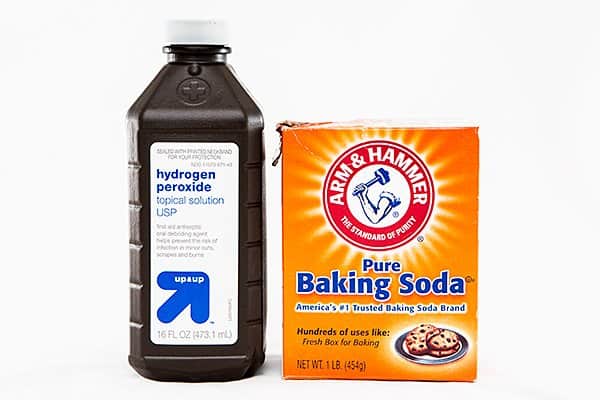
Baking soda helps maintain the pH balance of your skin and acts as an exfoliating agent. Combining it with hydrogen peroxide can be a potent solution to destroy pimples and promote skin healing.
You’ll need:
- 1 tablespoon baking soda
- 1 tablespoon hydrogen peroxide
- Non-comedogenic moisturizer
- Facial cleanser
Instructions:
- Wash your face with a facial cleanser and pat it dry.
- In a bowl, combine baking soda and hydrogen peroxide. Stir until smooth.
- Apply on your face, avoiding the area around the eyes. Leave it for five minutes, then rinse with cold water. Pat your face dry and apply moisturizer.
- Repeat once per week.
Tea Tree Oil and Hydrogen Peroxide
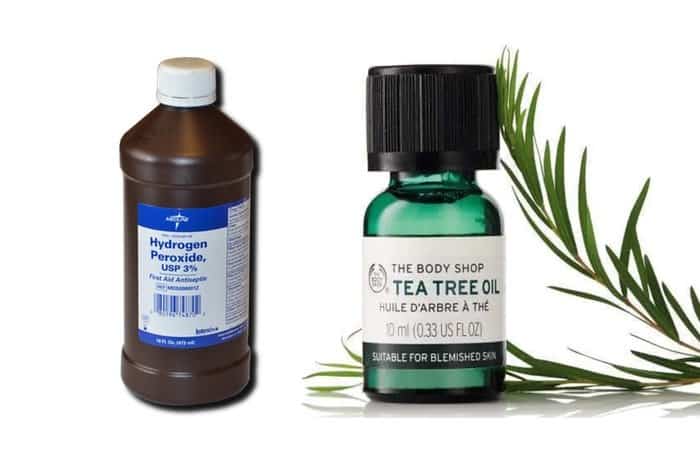
Hydrogen peroxide offers antimicrobial properties, while tea tree oil has antibacterial properties. Together, they form a potent mixture to help clear acne.
You’ll need:
- 1 tablespoon tea tree oil
- 1 teaspoon hydrogen peroxide
Instructions:
- Wash your face with a facial cleanser and pat it dry before applying the acne mask.
- Mix the ingredients in a bowl and stir until smooth.
- Apply on the affected area, avoiding the area near your eyes. Leave the mask for five minutes, then rinse with cold water and finish with a moisturizer.
- Use no more than twice per week.
Aloe Vera and Hydrogen Peroxide
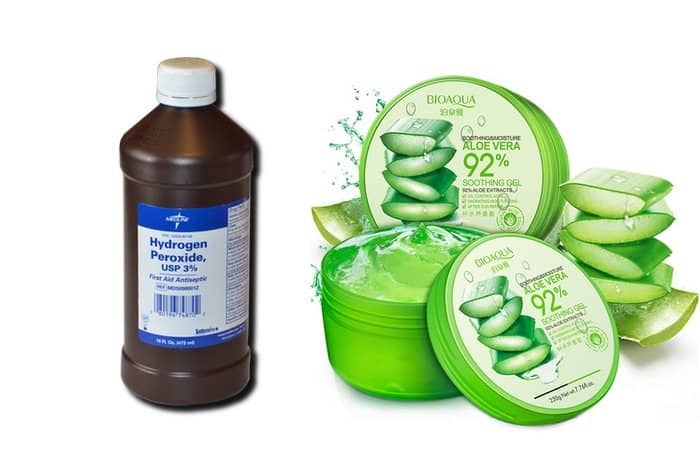
Aloe vera can help calm your skin and soothe irritation. Its antibacterial properties speed up the skin’s healing process. Aloe vera is an excellent complement to hydrogen peroxide, as it reduces redness after the peroxide treatment.
You’ll need:
- 1 teaspoon hydrogen peroxide
- 1 tablespoon aloe vera gel
Instructions:
- Wash your face with a facial cleanser. Apply hydrogen peroxide using a cotton ball.
- Leave it for five minutes, then rinse with cold water.
- Pat your face dry and apply a thin layer of aloe vera onto your skin. Leave the aloe vera on.
Lemon Juice and Hydrogen Peroxide
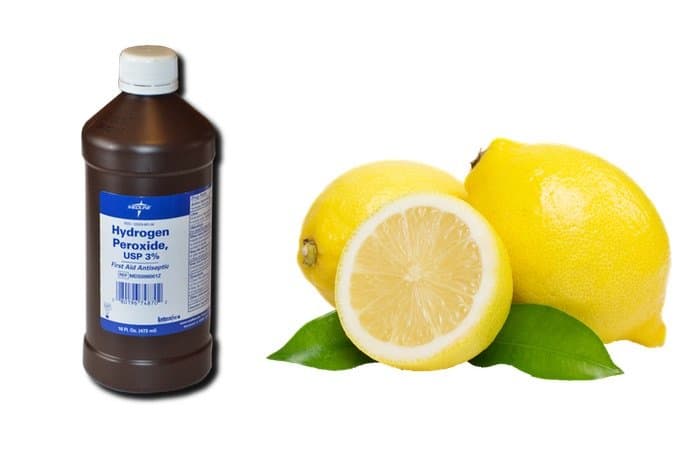
Lemon juice, a natural lightening agent, can help reduce acne and lighten old acne scars. Combined with hydrogen peroxide, it controls oil production and prevents recurring acne breakouts.
You’ll need:
- 1 teaspoon lemon juice
- 1 teaspoon hydrogen peroxide
Instructions:
- Wash your face and pat it dry.
- Combine the ingredients in a bowl and stir until smooth.
- Apply on the affected areas and leave for five minutes. Wash with cold water, pat dry, and apply moisturizer.
- Repeat only once per week.
Are There Any Side Effects?
While using hydrogen peroxide topically on the skin, irritation is the most commonly reported side effect. We recommend not using concentrations higher than 3% to avoid serious skin burns and blistering.
Here are some potential side effects and risks associated with hydrogen peroxide:
- Skin irritation and inflammation
- Redness and dryness
- Pain or burning sensation
- Allergic reactions
- Serious side effects if accidentally applied to an open wound
Always perform a patch test before trying hydrogen peroxide on acne-prone areas, and never apply it to open wounds, as it can lead to a potentially fatal condition called embolism.
